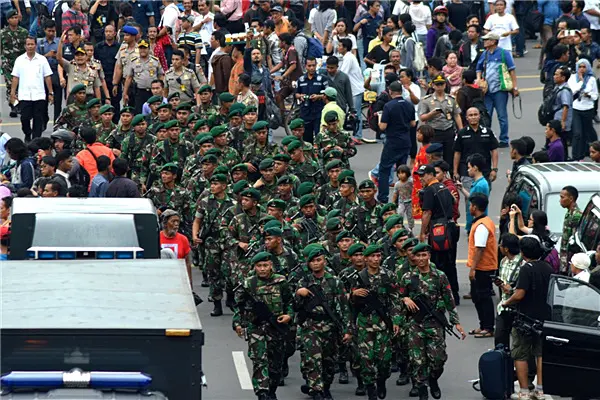The Indonesian army in downtown Jakarta following terrorist attacks that hit the city on Jan. 14, 2016.PHOTO:JEFF ARIES/ZUMA PRESS
(THE WALL STREET JOURNAL) Communications app Telegram Messenger is in the spotlight following the deadly terrorist attacksin Jakarta last week, with experts in Indonesia and Malaysia saying Islamic State radicals in Syria have used the platform to recruit members from Southeast Asia.
The revelations underscore both the apparent popularity of the Berlin-based app among members of the Islamic State terror organization and the challenges it poses to authorities in tracking its private, encrypted chats.
Malaysian police on Saturday said its counterterrorism unit last weekarrested four suspects, three of whom were recruited to join the Islamic State in Syria by a Malaysian national via Telegram andFacebookInc.’s social-networking platform.
Telegram, which in November said itblocked 78 of its public channelsacross 12 languages related to Islamic State, was one of the first apps to explicitly cater to privacy enthusiasts following reports in 2013 alleging widespread surveillance by U.S. intelligence.
Islamic State has used Telegram, a free platform that can be accessed via mobile devices and desktop computers, to disseminate public statements, such as its claim of responsibility for the November attacks in Paris.
Law-enforcement agencies have warned that encrypted platforms that may have originally been built for legitimate commercial and gaming purpose are being used by violent groups to stay hidden. Islamic State even has tutorials about the most secure and least expensive ways of communicating while avoiding surveillance.
An Islamic State guide circulated last year ranked more than 30 chat apps on how safe they are from snooping. Telegram was rated safe, Facebook messenger was rated moderately safe and WhatsApp was ranked unsafe.
“All reported public content by ISIS gets removed promptly,” Telegram spokesman Markus Ra told The Wall Street Journal, referring to another name for the terror group, noting that removal is usually done within 24 hours.
Pavel Durov,the app’s founder, said in a tweet Friday that more than 600 public Islamic State-related channels have been removed since November, and that between five and 10 are banned every day.
Mr. Ra declined to comment on Malaysian authorities’ statements about the alleged use of Telegram.
“There is no place for terrorists on Facebook,” said a Facebook spokeswoman. “We work aggressively to ensure that we do not have terrorists or terror groups using the site, and we also remove any content that praises or supports terrorism.”
Despite the November crackdown, Islamic State-related material on Telegram is still widespread today, according to Steve Stalinsky, executive director of the Washington, D.C.-based Middle East Media Research Institute.
“We’ve been monitoring terrorists’ use of the Internet for 10 years,” he said, noting that terrorists first flocked to blogs and Web forums, thenTwitter,and are now taking to encrypted messaging apps—Telegram chief among them.
“It’s like an explosion,” Mr. Salinsky said. “It really serves that community.”
Mr. Stalinsky noted that he is aware of roughly two hundred Telegram channels that are in operation, some attracting 500 or 1,000 individuals each. “It’s way more than when they shut down the 78,” he said.
In the wake of terror attacks in Paris and California, the Federal Bureau of Investigation has been pushing technology firms to allow investigators to decrypt private communications during terror probes.
Many in the tech industry, however, argue that strong encryption is needed to protect users’ privacy.
Indonesian police say a local man named Bahrun Naim, an Islamic State adherent now based in Syria, sent money to the group of terrorists who carried out bomb and gun attacks in downtown Jakarta last week, leaving eight people dead, including the four attackers.
Police have said Mr. Naim communicated with the men via the Internet, but have declined to provide specifics.
Mr. Naim used Telegram to communicate with pro-Islamic State supporters in Indonesia he was trying to rally as followers, saidSidney Jones,head of the Jakarta-based Institute for Policy Analysis of Conflict, based on her knowledge of interviews with militants who police arrested in August and December on suspicions that they were planning a series of attacks in Indonesia.
“All of the communications between Bahrun Naim and his would-be minions in Indonesia took place over Telegram,” Ms. Jones said. “One of the things it tells you is we have a real problem with the fact that this is an encrypted service that no one can intercept.”
Indonesia’s Ministry of Communication and Information Technology in the past year has blocked access to dozens of websites it says contained radical content, including 11 in the wake of Thursday’s attacks.
But Minister Rudiantara, who like many Indonesians goes by one name, said that the country isn't planning to ban access to messaging platforms and social networks.
“I don’t think we are in a situation that requires such a move,” Mr. Rudiantara said.
In Malaysia, the Ministry of Communications said in a written response to questions that the government “views seriously the abuse of such technologies…We shall take stern action in such instances and review the use of the application if it is proven to facilitate acts of terrorism in this country.”
 简体中文
简体中文

